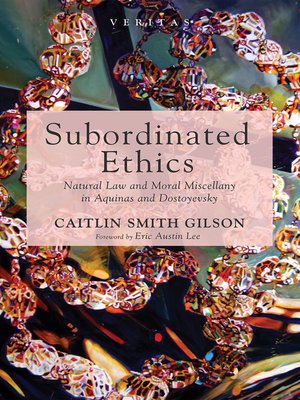Subordinated Ethics
ebook ∣ Natural Law and Moral Miscellany in Aquinas and Dostoyevsky · Veritas
By Caitlin Smith Gilson

Sign up to save your library
With an OverDrive account, you can save your favorite libraries for at-a-glance information about availability. Find out more about OverDrive accounts.
Find this title in Libby, the library reading app by OverDrive.



Search for a digital library with this title
Title found at these libraries:
| Library Name | Distance |
|---|---|
| Loading... |
With Dostoyevsky's Idiot and Aquinas' Dumb Ox as guides, this book seeks to recover the elemental mystery of the natural law, a law revealed only in wonder. If ethics is to guide us along the way, it must recover its subordination; description must precede prescription. If ethics is to invite us along the way, it cannot lead, either as politburo, or even as public orthodoxy. It cannot be smugly symbolic but must be by way of signage, of directionality, of the open realization that ethical meaning is en route, pointing the way because it is within the way, as only sign, not symbol, can point to the sacramental terminus. The courtesies of dogma and tradition are the road signs and guideposts along the longior via, not themselves the termini. We seek the dialogic heart of the natural law through two seemingly contradictory voices and approaches: St. Thomas Aquinas and his famous five ways, and Fyodor Dostoyevsky's holy idiot, Prince Myshkin. It is precisely the apparent miscellany of these selected voices that provide us with a connatural invitation into the natural law as subordinated, as descriptive guide, not as prescriptive leader.







